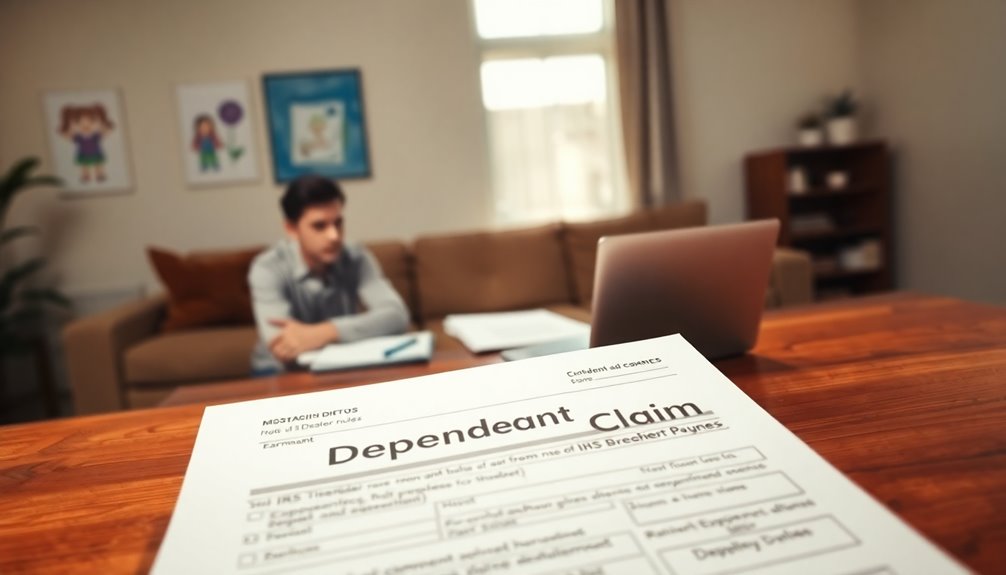Yes, you can get in trouble for claiming someone else's child on your taxes. If you knowingly make false claims, you're risking civil and criminal penalties, including hefty fines and even jail time. The IRS allows only one person to claim a dependent each year, with custodial parents having priority. Without proper documentation and consent from the custodial parent, you could face audits and severe financial penalties. It's crucial to understand the rules and maintain accurate records. Learn how to protect yourself and avoid pitfalls that could lead to major trouble.
Key Takeaways
- Claiming another person's child as a dependent can result in civil and criminal penalties, including tax fraud charges.
- Incorrect claims may lead to fines up to $100,000 and imprisonment for up to three years.
- Tax fraud can incur civil penalties of up to 75% of the understated tax liability.
- Only one person can claim a child as a dependent, prioritizing custodial parents over non-custodial ones.
- Accurate documentation is essential to prove eligibility and avoid disputes or penalties from the IRS.
Legal Consequences of Incorrect Claims

Claiming someone else's child as a dependent can lead to serious legal consequences, including both civil and criminal penalties. If you knowingly and willfully make false statements on your tax return regarding a dependent, you could be committing tax fraud. The IRS has specific criteria for claiming a dependent, such as age, relationship, residency, support, and income. Remember, only one person can claim a dependent in a given tax year, and the IRS actively flags duplicate claims. If you are found to have committed civil fraud, you could face penalties up to 75% of the understated tax liability. Even if it's deemed negligence rather than fraud, you might still incur a 20% penalty on the additional taxes due. Furthermore, filing false returns can lead to criminal charges if you willfully file false tax returns, potentially resulting in fines up to $100,000 and imprisonment for up to three years.
If the IRS flags your claim, be prepared to provide documentation to prove your dependency claim. Resolving disputes promptly is crucial, and clear communication with the IRS can help mitigate the fallout from incorrect claims.
Understanding IRS Tiebreaker Rules

Navigating the IRS tiebreaker rules is essential for anyone claiming a child as a dependent, especially in situations where multiple people may be eligible.
First, if only one person is the child's parent, that parent automatically claims the child. If parents file jointly, the child belongs to them as a unit. However, if they don't file together, the tiebreaker rules come into play.
When both parents claim the child, the one with whom the child lived longer gets to claim them. If the time spent is equal, the parent with the higher adjusted gross income (AGI) wins the claim. If no parent can claim the child, the person with the highest AGI takes precedence. Dependents must rely on another person for financial assistance to qualify, which can further complicate claims.
It's crucial to remember that only one person can claim the child for various tax benefits, such as the Earned Income Tax Credit and Child Tax Credit.
Special rules also apply for divorced or separated parents, allowing noncustodial parents to claim the child under specific conditions. Be sure to understand these rules to avoid confusion and potential penalties when filing your taxes.
Importance of Documentation

Proper documentation is essential when it comes to claiming someone else's child on taxes, as it can save you from potential penalties and maximize your deductions. Accurate and complete records are necessary to support your claims, especially when it involves dependents. Inaccurate claims can lead to hefty penalties from the IRS, including additional taxes and interest.
You should gather crucial documents such as birth certificates, proof of identity, and residency records to substantiate your claims. School, medical, and social service records can also be invaluable in confirming the child's eligibility. By maintaining detailed records, you can ensure you meet the support test and joint return test requirements, which are critical for claiming tax credits. Proper documentation enables full utilization of available deductions, allowing you to maximize your tax savings.
Organized documentation not only streamlines your tax preparation but also minimizes errors in reporting income and claiming deductions. Having a tax preparation checklist can help ensure you have all necessary documents in place.
Plus, keeping these records allows for timely submission if the IRS audits your return. Ultimately, proper documentation is vital for compliance with IRS regulations, helping you avoid penalties and ensuring you're fully prepared for any tax-related inquiries.
Preventing Duplicate Claims

Preventing duplicate claims on a dependent can save you a lot of headaches during tax season.
To start, remember that only one person can claim a dependent in a given tax year. If you're the custodial parent, you generally have the priority, but if you're the non-custodial parent, make sure you have the necessary permissions or follow your divorce decree. This often requires a written declaration from the custodial parent using Form 8332. Conducting thorough background checks on your own tax claims can help ensure accuracy and compliance.
To protect your dependent's identity, obtain an IRS IP PIN, ensuring their Social Security number (SSN) is accurate and matches IRS records.
Communicate with other eligible claimants to avoid misunderstandings. Filing your tax return early can also help reduce the risk of duplicate claims.
If your e-filed return gets rejected due to a duplicate claim, switch to filing a paper return. Double-check all dependent information to avoid rejections, and if needed, exclude the dependent from your electronic filing, amending later as necessary.
Starting from the 2025 filing season, you can use the IRS IP PIN to e-file, even if someone has already claimed the dependent.
Being proactive and informed will keep your tax experience smooth and trouble-free.
Impact on Tax Benefits

Claiming a dependent on your tax return can significantly impact your tax benefits, but it's crucial to ensure that the claim is valid. When you correctly claim a dependent, you may lower your taxable income, leading to a larger tax refund or reduced tax liability.
However, if the IRS finds your claim invalid, they'll correct it, which can result in a higher taxable income and potential penalties. Moreover, claiming dependents can make you eligible for valuable tax credits like the Child Tax Credit or Earned Income Tax Credit. If you incorrectly claim a dependent, you risk receiving credits you're not entitled to, and the IRS will revoke them. This could also delay your access to legitimate credits during a dispute.
Incorrectly claiming a dependent might trigger an audit, potentially resulting in additional taxes, penalties, and interest. The audit process can be lengthy and complicate your future tax planning. Continuous eligibility assessment is crucial to ensure that you are claiming dependents correctly and maximizing your tax benefits. Your filing status, such as head of household, could also be impacted, affecting benefits like childcare credits. Always double-check your claims to avoid these pitfalls and ensure you maximize your tax benefits ethically and legally.
Identity Theft Concerns

Identity theft poses significant risks, especially when it comes to claiming dependents on your tax return. Identity thieves often gather essential information—like names, Social Security numbers, and dates of birth—to file bogus tax returns.
Children's identities are especially enticing to these criminals, as a complete package of a child's identity can sell for more than an adult's. Once this information is stolen, it can end up on the dark web, where it may be used for various fraudulent activities, such as applying for loans or credit cards. Tax fraud can involve deception resulting in material damage, which is why using someone else's child's identity for tax benefits is considered a serious offense.
The IRS may not catch every fraudulent return; in fact, an estimated 1.5 million undetected returns could result in over $5 billion in fraudulent refunds. If you suspect identity theft, the IRS flags your account for extra scrutiny. They send a notice when this flag is placed, and any returns filed under your identification number will undergo additional screening.
To protect yourself, consider obtaining an IRS Identity Protection PIN. This PIN acts as a safeguard, preventing unauthorized individuals from e-filing a return in your name or claiming dependents without your permission.
Keeping a close watch on your records can help you catch potential identity theft early.
Steps for Dispute Resolution

When you find yourself in a situation where someone else has claimed your child as a dependent, it's essential to understand the steps for dispute resolution.
First, if the IRS rejects the e-filed return of the other claimant, they'll need to file a paper return claiming the child. This return will be processed normally, and both parties will receive a letter (CP87A) about the duplicate claim.
About two months after the paper return is filed, the IRS will contact both parties, stating that the child was claimed on another return. If you believe you're the rightful claimant, prepare to provide documentation, like school or medical records, to prove guardianship and residency. Additionally, having an Intuit account can facilitate access to personalized support for navigating this dispute.
Remember, if you don't file an amended return, the IRS may initiate an audit.
In cases where both parties claim the child, tiebreaker rules apply. If the child spends equal nights with both parents, the one with the higher adjusted gross income can claim them.
If the dispute isn't resolved, be prepared for an IRS audit, and remember, responding promptly to IRS requests can help resolve the situation efficiently.
Penalties for Willful Fraud

Improperly claiming someone else's child on your tax return can lead to severe penalties, including both criminal and financial repercussions. If you file a false return, you could face up to three years in prison. For tax evasion or perjury, the penalty increases to five years. Additionally, individuals may incur fines up to $250,000, especially if the IRS proves you acted with willful intent to evade taxes.
Financial penalties don't stop there. You might owe the IRS additional taxes, fines, and interest, which can also reach $250,000. In rare cases, if foreign accounts are involved, penalties could spike to 300% of the highest balance. The IRS audits both parties involved to clarify who rightfully claims the dependent, often requiring extensive documentation.
If your return is flagged, you could face administrative consequences, like rejection of your tax return and denial of credits. You may need to file an amended return and could be subject to future audits. Ultimately, the consequences of willfully claiming someone else's child are serious, leading to legal trouble and significant financial ramifications. Furthermore, improper claims may lead to IRS investigations, which often stem from tips, audits, or data analysis indicating potential fraud.
Communicating With Claimants

Navigating the complexities of claiming a dependent can be challenging, especially if another party has also filed a claim. You won't know who that other claimant is since the IRS doesn't disclose this information. It could be a former spouse or a relative.
If you can't identify the other claimant, be wary—it might indicate tax identity theft. Start by communicating with your family members or former spouse to clarify the situation. Gather and provide documentation proving the dependent's residency and your support. Collect birth certificates, proof of identity, and records showing the dependent lived with you for over half the year. School, medical, or daycare records can serve as strong evidence. Additionally, having an Intuit account can facilitate access to resources that assist in managing these claims effectively.
If you receive a letter from the IRS (CP87A) indicating someone else claimed the dependent, respond promptly. The IRS will require you to either amend your return or take no action if your claim is valid.
If the matter isn't resolved, be prepared for potential audits, penalties, or additional taxes. Understanding these steps will help you navigate the process effectively and protect your interests.
Frequently Asked Questions
Can I Claim My Girlfriend's Child as a Dependent?
You can claim your girlfriend's child as a dependent if certain conditions are met.
The child must live with you for the entire year, you must provide more than half of their support, and no one else can claim them.
Make sure the child meets citizenship requirements, and keep documentation of your support.
If these criteria are satisfied, you should be eligible to claim the child on your tax return.
What if I Have a Signed Agreement to Claim the Child?
If you have a signed agreement, like Form 8332, you can claim the child as a dependent on your tax return.
Just make sure the custodial parent signs it and that you attach it to your return. This agreement should clearly state the years each parent can claim the child to avoid future disputes.
Keeping good records and responding promptly to any IRS inquiries is key to ensuring everything goes smoothly.
How Does Claiming a Child Affect My Tax Refund?
Claiming a child on your taxes can significantly impact your refund. If someone else has already claimed that child, your return could be rejected, causing delays in your refund.
You might also need to repay any refund you received, plus interest and penalties. Additionally, your eligibility for credits like the Child Tax Credit may be affected, potentially reducing the amount you receive or eliminating it altogether.
Always ensure you're the rightful claimant to avoid issues.
Can I Claim a Child Who Lives With Me Part-Time?
Yes, you can claim a child who lives with you part-time, but certain conditions must be met.
The child must reside with you for more than half the year, and you need to provide more than half of their support.
Temporary absences for school or other reasons don't disqualify them.
Make sure you have the proper documentation, like school records, to support your claim and meet IRS requirements.
What if the Child Has a Different Last Name?
If the child has a different last name, don't worry too much, but you should file your return using the name that matches their Social Security records.
The IRS mainly checks the first few letters of the names, so as long as you provide accurate information, you should be fine.
Just make sure to correct any discrepancies with the Social Security Administration for future filings to avoid complications.
Conclusion
In conclusion, claiming someone else's child on your taxes can lead to serious legal issues. You risk facing penalties, losing tax benefits, and even being accused of fraud. It's crucial to gather proper documentation and communicate with the child's rightful claimants to avoid disputes. If you find yourself in a conflict, knowing the IRS tiebreaker rules can help. Always be cautious and informed to protect yourself from potential identity theft and unnecessary trouble.









